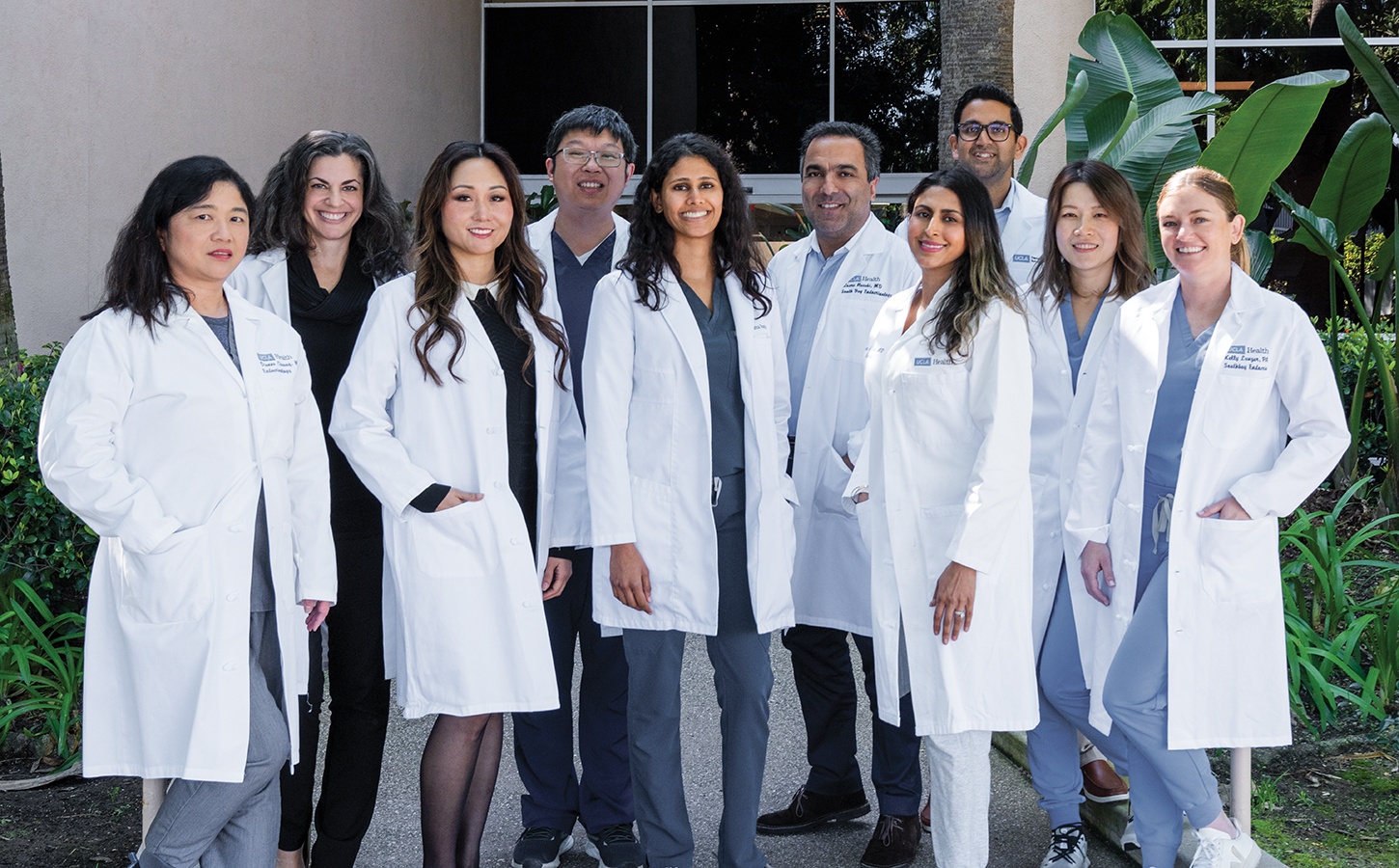UCLA Health Specialty Care

- Address
3445 Pacific Coast Highway,
Suite 100, Torrance - Phone
310-542-6333
- Website | Social
- Photographed by
Shane O’Donnell
- Special Section
Above L to R Front: Dianne Cheung, MD; Jennifer Han, MD; Erica Patel, MD; Huma Kennedy, MD; Kelly Lunzer, PA Back: Avital Harari, MD; Robert Li, MD; Kasra Navabi, MD; Vivek Bose, MD; Michelle Hwang, MD Not pictured: Aarthi Arasu, MD; Connie Rhee, MD; Albert Shieh, MD; Harpreet Sidhu, MD
•••
Services Offered
- Insulin pump management
- Fine-needle aspiration
- Ultrasound of thyroid
- Diabetes management
- Osteoporosis management
Endocrinology & Nephrology
The UCLA Health endocrinology team includes experts in clinical care, research and education. We offer the newest techniques and provide patients with the most advanced care, including consultations, diagnosis and treatment for a full range of endocrinology diseases and problems. When you choose UCLA Health, you’ll receive outstanding, comprehensive care from top experts dedicated to your well-being.
UCLA Health nephrology specialists are leaders in research and treatments for all types of kidney disease. We have one of the longest-running kidney transplant programs in the country, and we lead the nation in the number of transplants we perform every year. Patients benefit from our vast experience as a top medical center and our expertise in diagnosing and treating kidney disease and preserving kidney function.
Endocrinology Advancements
Dianne Cheung, MD – Endocrinology UCLA Health has a community clinical trials program in the South Bay that is focused on new drug therapies for diabetes and metabolism. I am honored to be the principal investigator for these trials that will change the way diabetes and its related complications are managed for years to come.
Also, the South Bay office is the only UCLA Health location that is currently offering real-time telecytology for thyroid nodule fine-needle aspiration (FNA) testing. This program allows UCLA Health cytopathologists to do live telemed FNA readings. This real-time results program confirms sample adequacy, reduces redundancy and decreases wait time for results.
Preventive Nephrology
Michelle Hwang, MD – Nephrology Nephrologists are physicians who manage kidney diseases, high blood pressure and electrolyte imbalances. Approximately 1 in 3 Americans are at risk for kidney disease, which often has few or no symptoms. Simple blood and urine tests can detect early kidney disease to delay or prevent progression. I recommend that patients stay well hydrated, exercise, control cholesterol and monitor their blood pressure. Certain over-the-counter medications may cause kidney disease, including NSAIDs such as ibuprofen. It’s important to get blood tests and urine tests on a regular basis if you are at risk.
Managing Diabetes
Jennifer Han, MD – Endocrinology Lifestyle changes are an extremely effective way to manage diabetes. The goals of lifestyle intervention are centered around decreasing body weight by about 5%, increasing physical activity levels to at least 150 minutes per week and increasing dietary fiber. In terms of strategies, individual or group nutrition counseling is offered at UCLA Health in individual or group settings.
Preventing Bone Loss
Albert Shieh, MD – Nephrology Nephrology is related to bone health in that kidney disease can cause your bones to be more susceptible to fractures by becoming “soft,” or it may affect the rate at which your bones repair areas of damage within the skeleton. Fracture risk also increases during menopause because bone loss accelerates. The best approach for preventing menopause-related bone loss is an area of active research. Risk factors for bone loss include an inflammatory diet and greater insulin resistance. Regular physical activity may help mitigate bone loss. Another reason that fracture risk increases during menopause is changes in body composition. Specifically, women gain fat mass and lose muscle mass during menopause. Both of these changes contribute to greater fracture risk.
Endocrine Conditions
Aathi Arasu, MD – Endocrinology Most people know that endocrinologists help patients with diabetes, but we also treat thyroid conditions, osteoporosis, calcium disorders, and adrenal and pituitary gland disease. Patients should see an endocrinologist if referred by their primary care physician or if their endocrine condition needs to be further optimized.
Staying Hydrated
Huma Kennedy, MD – Nephrology Electrolytes are related to nephrology in that they help maintain kidney health. Adequate hydration is important during all four seasons. Excessive sweating that can occur with vigorous exercise and in hot weather during spring or summer can lead to excessive fluid loss. This includes water and electrolytes. Recommendations for each person regarding electrolytes differ based on their age, weight, physical activity and health conditions. Speak to your physician if you have concerns of excessive fluid loss.





